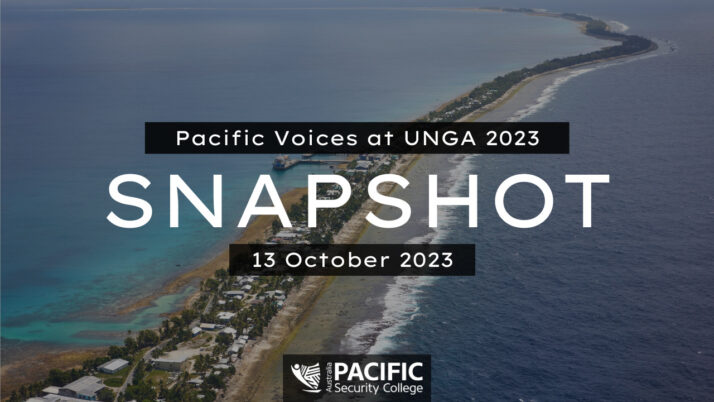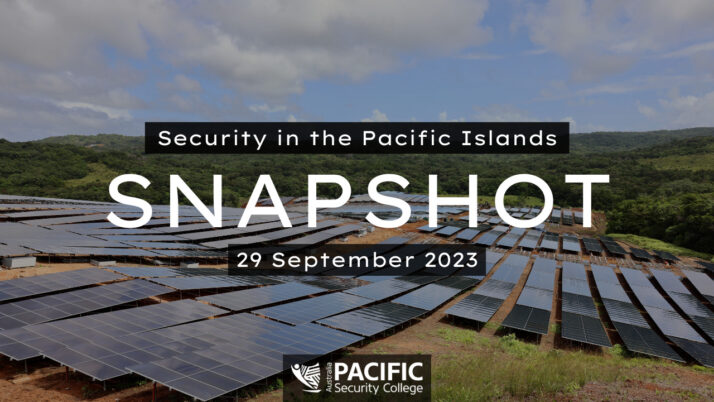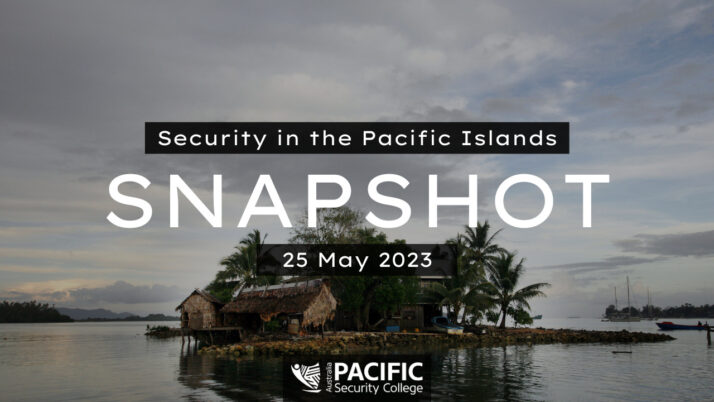Pacific Security Snapshot: Pacific voices at the United Nations

In this special edition of the Pacific Security Snapshot, we look at the key issues raised by Pacific leaders at the recent United Nations General Assembly, including climate change, reform to multilateral institutions and ocean health.
“These challenges might be inconvenient for large economies – but I can assure the climate impacts already at our door, and those yet to come, are decidedly more inconvenient for low-lying atoll states like mine, and for other island nations around the world.” – Republic of the Marshall Islands President David Kabua
The theme of the 78th session of the United Nations General Assembly was Rebuilding trust and reigniting global solidarity: Accelerating action on the 2030 Agenda and its Sustainable Development Goals towards peace, prosperity, progress and sustainability for all. The sentiment of reignition carried through the addresses made by Pacific delegates in the general debate. As the region has often relied on multilateralism to pursue its security interests and agenda, leaders used this year’s session to call for reform and greater global ambition to address regional priorities.
The first Forum Island Country (FIC) to address the general debate was Palau. President Surangel J. Whipps began with an outline of challenges faced by many Pacific Island nations, including the rising cost of imported food, outmigration and the COVID-19 pandemic. Starting off the climate advocacy carried by every Pacific speaker, President Whipps called climate change the biggest challenge to regional progress on Sustainable Development Goals but urged for optimism on the power of multilateralism in combatting climate change, stating “Together, we are unstoppable. Together, we can ensure a thriving planet for generations to come.”
Micronesian representatives Marshall Islands, Federated States of Micronesia (FSM) and Nauru all noted that progress continues to be hampered by the structure of the UN system. FSM President Wesley W. Simina, along with Solomon Islands Prime Minister Manasseh Sogavare, called for the reform of the UN Security Council to include a permanent seat representing Small Island Developing States.
Reform was also advocated as the solution to enhancing Pacific access to climate financing and debt relief. Tonga, Papua New Guinea, Vanuatu, Fiji and Solomon Islands called for reform of the international financial architecture, with Papua New Guinea Deputy Prime Minister John Rossa labelling the current system “unfair and archaic.”
Beyond multilateral institutions, many FICs called on emitting countries to strengthen emissions reduction targets and commitments to keep global warming within 1.5 degrees Celsius. Vanuatu highlighted that the twin cyclone event earlier this year and resulting total recovery needs are expected to be around 77% of the country’s GDP, calling for a change to the “woefully inadequate” state of global mitigation efforts. Samoan Prime Minister Fiame Mata’afa emphasised what’s at stake for keeping 1.5 degrees Celsius alive, telling the Assembly that “crossing this threshold spells the end of many of our island societies.”
Prime Minister Mata’afa further noted the fight against climate change requires a healthy ocean, stating “the ocean is in us and we are the ocean.” Samoa, along with FSM, Palau, Solomon Islands, Fiji, New Zealand and Australia signed the Biodiversity Beyond National Jurisdiction agreement whilst in New York. Tuvalu Prime Minister Kausea Natano used his address to reflect the agreement’s importance in “preserving the health and diversity of the ocean ecosystems for both its own sustainability and the well-being of the global community.”
In Fiji’s address, Prime Minister Sitiveni declared that “our blue Pacific is at the centre of geopolitical tensions.” Geopolitical dynamics were touched on by PNG, Samoa, Solomon Islands, FSM and Kiribati, however the focus was clearly on Pacific security priorities.
Human security challenges including high rates of gender-based violence, poverty and non-communicable diseases were also raised as challenges by many FICs, including Tonga, PNG and Samoa. Tonga Prime Minister Hu’akavameiliku Siaosi Sovaleni said, “it is unacceptable” that progress towards gender, poverty and hunger have “either stalled or reversed.”
Returning to the greatest regional security threat, climate change, Pacific leaders looked to COP28 as the opportunity for the international community to show their support through the operationalisation of the Loss and Damages Fund. The urgency of this fund was expressed by FSM President Wesley Simina: “It is time for those most responsible for climate change to put your money where your mouth is, for the cost of not doing so is far greater than what could ever be quantified.”
More Stories

Security Snapshot - 29 Sep 2023
Pacific Security Snapshot | 29 September 2023
The security stories shaping the region ➣ 2nd United States-Pacific Islands Forum Summit ➣ Niue and Cook Islands forge diplomatic ties with United States ➣ Chinese navy vessel arrives in Papua New Guinea ➣ Pacific climate change advocacy at the United Nations ➣ El Niño is officially declared ➣ Fifteenth Pacific Health Ministers Meeting in…

Security Snapshot - 26 May 2023
Pacific Security Snapshot | 25 May 2023
The security stories shaping the region ➣ Papua New Guinea and the United States sign Defence Cooperation Agreement ➣ United States-Pacific Islands Forum Dialogue held in Port Moresby ➣ Pacific leaders meet Indian Prime Minister Narendra Modi ➣ Pacific call for climate finance breakthrough at UN session ➣ Tuvalu strengthens efforts against illegal, unreported and…






